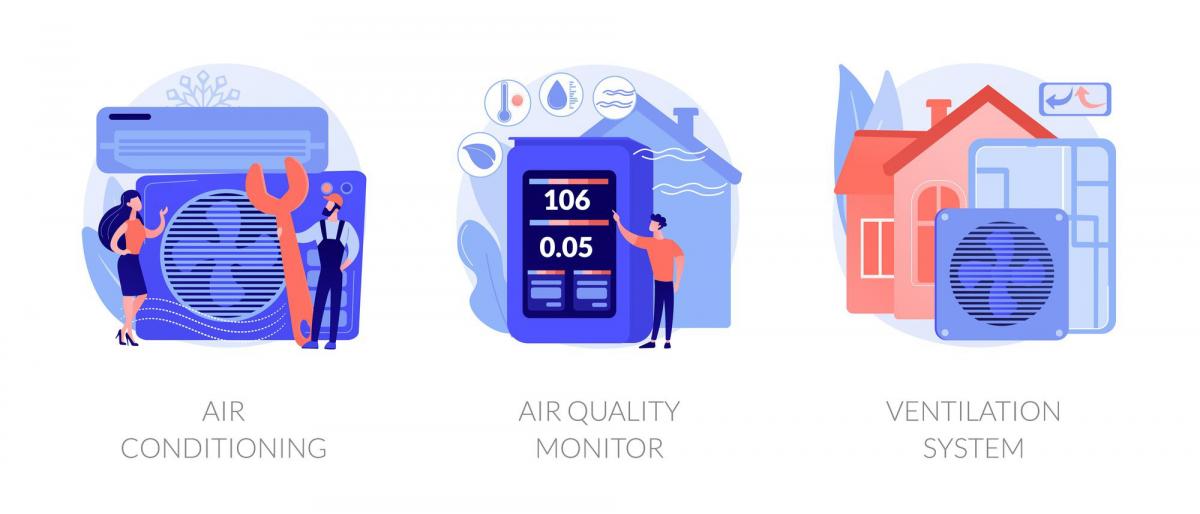Industrial Covid Air Sanitizer Solutions: Humidifiers vs. Diffusers
Good ventilation is key to limiting the spread of airborne infectious diseases. Droplets and aerosols are normal byproducts of many routine dental procedures: common dental instruments such as air and water syringes and ultrasonic scalers all create some form of spray. And although intra-oral evacuation devices capture a high proportion of these aerosols, a multi-layered strategy is critical to minimize the risk of infection by Covid-19, as well as other potential pathogens. Now more than ever, it’s important to use the most effective Covid air sanitizer solutions for your dental practice.
The most basic method of minimizing infection is to control the source: cut down on tools and materials that cause aerosols. The latest digital dental systems—CAD/CAM dentistry, chairside milling, 3D printers, and digital impression for restorative work, orthodontics, and more—are invaluable here.
For instances in which a full digital conversion is not possible, hygiene comes down to ventilation. Increasing airflow through heating, ventilation, and air conditioning (HVAC) systems, or through the use of a high-speed extra-oral evacuation device, can improve your filtration and ventilation hygiene immensely.
But while air conditioning filtration systems improve air quality by trapping fine particles, their efficacy is limited. To effectively supplement existing air management processes, your air purification and cleaning systems should use at least one of the following:
- Ionization (negative ion purification)
- Shielded UV light (UV germicidal irradiation)
- Photocatalytic oxidation (PCO) to convert malignant contaminants into water, carbon dioxide, and detritus
- Electronic particle air cleaners
Importance of Covid Air Sanitizer Solutions in Dental Practices
Good indoor air quality has a host of benefits. From a purely hygienic standpoint, increased airflow decreases the likelihood of Covid-19 transmission, as well as other respiratory illnesses. Clean, fresh air can also improve workplace productivity. The reduction of contaminants and pathogens from the air therefore has important implications for both dental staff as well as patients.
Analyses of Covid-19 transmission estimate that indoor air quality has the strongest influence on the likelihood of infection. This is especially true in dental clinics, where viral pathogens have a substantially higher transmission probability than their bacterial counterparts. In certain high-risk cases—based on factors such as infectiousness of the individual as well as air quality—the likelihood of transmission can even rise to 99.4% for SARS-CoV viruses.
Poor indoor ventilation can result in respiratory aerosol particles remaining in the air for a very long time. Installing an air-cleaning unit can make all the difference, depending on its Clean Air Delivery Rate. Fifteen air changes per hour remain the recommended baseline. However, various factors play a role in determining a room’s ventilation rate, including the size of the space, the type of HVAC system, and the age of the building.
The CDC also recommends the use of a high-efficiency particulate air (HEPA) air filtration unit during and immediately after patient treatment. A portable HEPA can also expedite productivity, shortening patient turnover time from 35 to 18 minutes.
Humidifier vs. Diffuser
While they have a number of features in common, there are essential differences between humidifiers and diffusers. Understanding these differences is key when making a choice for your dental office.
Humidifiers add moisture to the air, using water vapor to raise humidity levels in a room. They relieve problems associated with dry air, such as scratchy throats, dry coughs, and dry skin, and help ease sinus swelling and congestion. Meanwhile, diffusers are smaller devices that use water to disperse essential oils into the air. While they provide aromatherapy benefits, they do not raise humidity or air quality levels significantly.
When it comes to dental office airflow, humidifiers are the better course of action. In addition to making the environment more comfortable for patients, they help relieve symptoms associated with asthma and allergies and reduce airborne bacteria, viruses, mold, and dust. Industrial humidifiers—which often include extremely precise humidity control to maximize particle adhesion—do particularly well in healthcare settings.
Protect Your Dental Practice and Your Patients With the ULVH9-4.5L Ultrasonic Humidifier
Covid air sanitizer solutions are a crucial aspect of protecting your dental practice and your patients. Humidifiers have proven to be effective tools for maintaining dental office indoor air quality, especially when paired with a disinfectant. In particular, the combined power of the ULVH9-4.5L Ultrasonic Humidifier with BN-200 HOCl disinfectant cleaner is an especially effective pairing in the fight against illness transmission in the dental office

The freestanding ULVH9-4.5L ultrasonic humidifier is quiet as well as being easy to operate and maintain. Ultrasonic vibrations disperse air sanitizer into an extra-fine mist covering up to 5,000 square feet of open space. The humidifier offers a 360-degree directional spray and adjustable humidity levels. With the filter-free ULVH9-4.5L, you can also add essential oils to an aroma box and infuse the office air with the scent of your choice.
However, this humidifier is specially designed to dispense the fast-acting, strong, safe, and effective BN-200 HOCl cleaner, which adds a disinfection component to air quality control. While all humidifiers traditionally deliver moisture into the air, not all are built to handle oxidants such as HOCI. In fact, if HOCl is used in a regular humidifier, it could quickly rust the device.
When added to water, BN-200 granules create a non-toxic HOCl disinfectant solution to combat a broad array of pathogens, including molds, fungi, and coronaviruses. BN-200 is pH-neutral, easy to use, more stable than bleach (and up to 300 times more effective!), as well as being biodegradable and noncorrosive.

Keep Your Practice Safe!
Sterngold is proud to offer the ULVH9-4.5L Ultrasonic Humidifier as a cleaning solution to purify air quality in dental offices. ULVH9-4.5L combines the best of a humidifier, air purifier, and diffuser in one solution. Get yours today!

